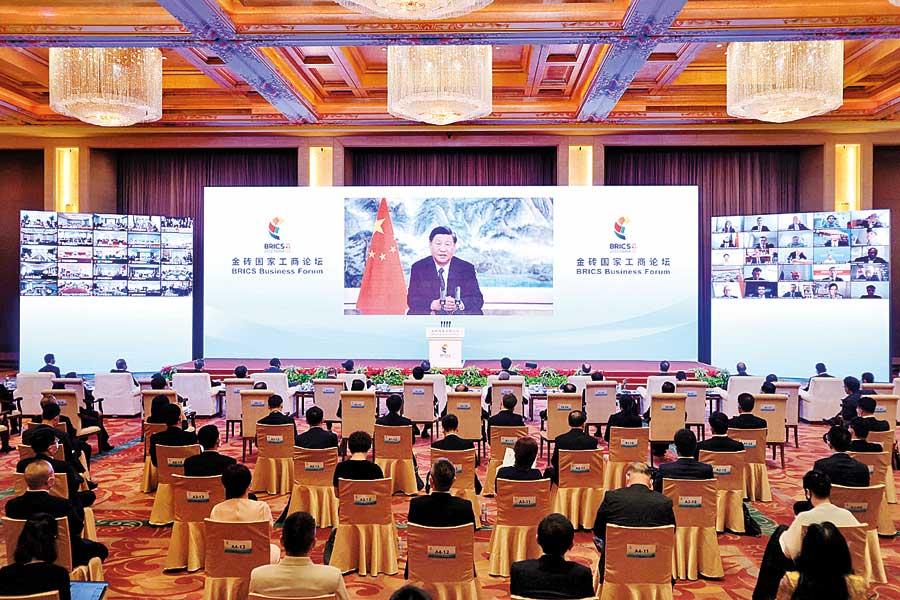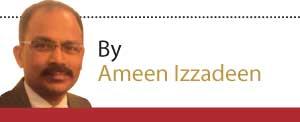
Chinese President Xi Jinping delivers a speech via video at the opening ceremony of the BRICS Business Forum, in Beijing, China June 22. Reuters

Yesterday’s meeting hosted by China was aimed at discussing economic challenges the member states -- Brazil, Russia, India, China and South Africa – were facing. It came at a time when a major tectonic shift has taken place in the international order, creating a new cold war between the West and Russia following the latter’s invasion of Ukraine in February. That the BRICS summit was held virtually was no cause to underestimate its significance. Detractors may try to undermine its importance by comparing yesterday’s virtual summit with last month’s Quad summit for which the leaders of the four countries – the United States, Japan, India and Australia – visited Tokyo. But BRICS, despite the economic slowdown during the two years of the Covid pandemic, is very much alive. BRICS’ Shanghai-based development bank – recently renamed as New Development Bank – is making steady progress in disbursing development funds to member states and several other countries are eager to join the group.
Judging by Russian President Vladimir Putin’s statement on Wednesday highlighting his intention to improve economic ties with BRICS and other non-Western nations and thereby mitigating the effects of Western economic sanctions, BRICS is set to receive a major impetus. Much was expected from the outcome of yesterday’s summit in terms of relief to billions of people who are struggling to cope with the rising cost of living, food shortages and other adverse consequences of the Ukraine war hastened by Western leaders’ provocation of Russia.
With a barrage of Western sanctions against Moscow pushing Russia to seek new markets, Putin has called for a strengthening of economic ties with BRICS and developing nations in Africa and Asia. Sri Lanka and other developing countries hunting for fuel at concessionary prices can benefit immensely if they respond to Putin’s call and improve relations with Russia while exercising caution not to harm their relations with the West.
“Businessmen of our countries are forced to develop their businesses under difficult conditions where Western partners neglect the basic principles of market economy, free trade, as well as the inviolability of private property,” the AFP quoted Putin as telling a BRICS business forum via video link.
He said Russia was “actively redirecting its trade flows and external economic contacts towards reliable international partners, above all the BRICS countries”.
“Russian oil deliveries to China and India are increasing. Agricultural cooperation is developing dynamically,” as is the export of Russian fertiliser to BRICS countries, he said.
Russia is also developing “alternative international transfer mechanisms” with BRICS partners and an “international reserve currency” to reduce dependence on the dollar and euro, Putin added.
In his statement is an invitation to improve business ties with Russia directed not only at fellow BRICS members but also at developing nations battered by economic crises of varying degrees.
India, just as BRICS members China, Brazil and South Africa, has not condemned Russia for its invasion of Ukraine though it has called for a peaceful settlement of the conflict, much to the chagrin of the US, which is trying to keep India in a security bind within the Quad framework. But, with its delicate diplomatic manoeuvres, India seems to have wriggled out of US efforts to trap it in the Quad net.
India has displayed its diplomatic acumen and is benefiting from its special relations with Russia in defiance of its Quad partners, who are, apart from denouncing Russia’s invasion, helping Ukraine with financial, political and military support. India’s Russia policy has apparently defined the Quad’s political boundaries. It is also interesting to note that although the Quad is aimed at checking China, the Quad leaders who met in Tokyo last month themselves did not name China in their final communique in which they announced a plan for the Indo-Pacific Partnership for Maritime Domain Awareness (IPMDA) to track illegal fishing and other illicit activities in waters of the Indo-Pacific region. It is obvious that the plan is to check China.
Just as India does not want its presence in the Quad to be seen as anti-Russia, it also does not want the BRICS summit to be seen as a West-bashing event.
By clearly defining its Quad ties and defending its special relations with Russia, India has declared in no uncertain terms that the Quad is not the Asian NATO as some overenthusiastic defence analysts portray it to be and that New Delhi is not willing to subscribe to a West-centric interpretation of the global order.
It is noteworthy to mention Indian Foreign Minister S. Jaishankar’s rebuke of Euro-centric world order at the GLOBSEC 2022 forum in Bratislava, Slovakia last month, when he was asked why India was not condemning Russia’s invasion of Ukraine.
Rejecting the West’s expectation that other countries should endorse its viewpoint of the conflict, Jaishankar in video clips that went viral across the world was heard to say, “Europe has to grow out of the mindset that Europe’s problems are the world’s problems, but the world’s problems are not Europe’s problems… the world cannot be [as] Eurocentric as it used to be in the past.
“If I were to take Europe collectively, which has been singularly silent on many things which were happening…in Asia, you could ask why anybody in Asia would trust Europe on anything at all.”
He then went on to say India would do exactly what Western countries do – evaluate a situation in the light of its own interests and take a decision.
This apart, the geopolitical significance of the BRICS launched in 2009 with the hope of creating a new economic order to help the developing world by making the group an economic superpower cannot be underestimated. BRICS with a combined population of 3.23 billion and a combined GDP of more than $23 trillion is seeking to usher in a viable global economic alternative to the US-led existing system.
Analysts say that to promote BRICS, China and Russia are likely to ignore irritants such as India’s Quad ties. While Russia banks on BRICS to bypass the effects of western sanctions, BRICS’ future squarely lies in the peaceful settlement of the Ukraine conflict and an early end to the western sanctions that are not only hitting Russia but billions of poor people all over the world.
India’s membership in BRICS and the Shanghai Cooperation Organisation requires it to work closely with China, despite its Quad commitments and longstanding border disputes which have resulted in military confrontations between the two countries. India has rejected China’s invitation to join the Belt-and-Road Initiative but is a member of the Beijing-led Asian Infrastructure and Investment Bank.
In view of India’s strong defence and economic ties with Russia and growing trade relations with China, along with the newly established Russia-China defence partnership, the ground realities do not augur well for the formation of a NATO-like defence arrangement in the Indo-Pacific region.

No comments:
Post a Comment